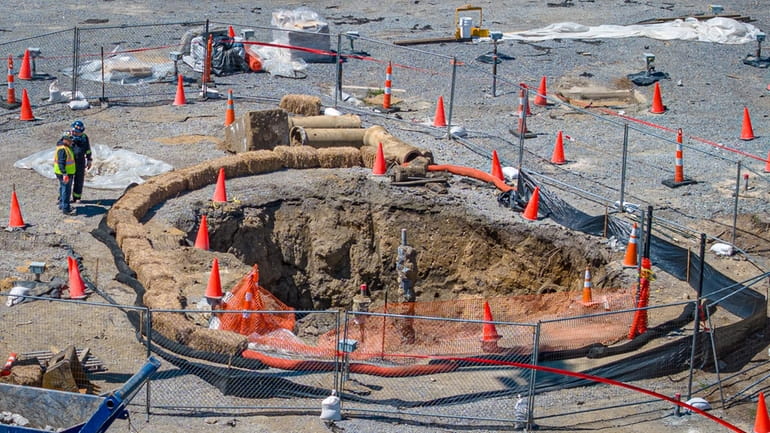Test results on ex-Grumman drums delayed by lab equipment problems, official says

Workers find more drums with possible toxic waste buried at Bethpage Community Park in Bethpage on Tuesday. Credit: Newsday/J. Conrad Williams Jr.
Equipment problems at a lab are delaying test results on the soil and chemical drums unearthed from a Bethpage Community Park pit where Grumman Aerospace for years dumped toxins, town and state officials said.
Starting early last week, contractors excavated 16 drums from three concrete layers embedded in the ground at the site. Tests showed the first six drums contained waste petroleum and chlorinated solvents including trichloroethylene (TCE), a known carcinogen.
Town Supervisor Joseph Saladino on Friday said Northrop Grumman had “failed to provide test results from both the second and third layer of drums,” which the town expected to begin receiving on Tuesday. He said the company cited “broken machinery” at the laboratory as the reason for the delay.
Northrop Grumman did not respond Friday for a request for information on the testing or the cause of the delay.
The town previously hired Woodbury-based D&B Engineers and Architects to conduct independent testing, and preliminary results from soil samples taken from the pit indicated the contaminants from the first round of chemical drums “match those in the soil,” according to Saladino.
“Our lab is currently performing additional testing to determine the impact of these contaminants,” said Saladino.
The state Department of Environmental Conservation said it is requiring Northrop Grumman to provide results as soon as possible in an effort to properly dispose of the soil, drums and their contents. So far, tests on the soil have been consistent with tests taken throughout the ongoing remediation at the park, officials said.
Tested soil has been shipped to an off-site facility, according to the DEC, and the first set of six drums are prepared to be shipped off-site for final disposal.
Northrop Grumman’s contractors began additional investigation Thursday to confirm there aren’t any more drums beyond the current excavation area, the DEC said earlier this week.
Three potential “anomalies” found during earlier ground-penetrating radar scans will not be further investigated until the current excavation work is completed, the DEC said on Wednesday.
New ground scans will begin again on Monday.
Northrop Grumman’s contractors will submit a work plan before any additional excavation is conducted, the DEC said. The discovery and removal of all of the drums “present no immediate threat to public health and safety at the site,” the agency said.
Oyster Bay sued Grumman Aerospace, the corporate predecessor of Northrop Grumman, over the pace of the ongoing remediation effort at the park. Saladino has remained critical of the company's progress on drum removal, saying the work is being completed at a “snail pace.”
There is a meeting at the Bethpage Public Library at 6 p.m. May 2 to call for the park’s ballfield to be cleaned and reopened.
Grumman donated land for the park to the town in 1962, and undisclosed contamination was found in the soil in 2002.
That dumping was found to be a major contributor to an expansive underground carcinogenic chemical plume that is more than 4 miles long, 2 miles wide and 900 feet deep. The plume continues to move south at the rate of about a foot per day, Newsday has reported.
Equipment problems at a lab are delaying test results on the soil and chemical drums unearthed from a Bethpage Community Park pit where Grumman Aerospace for years dumped toxins, town and state officials said.
Starting early last week, contractors excavated 16 drums from three concrete layers embedded in the ground at the site. Tests showed the first six drums contained waste petroleum and chlorinated solvents including trichloroethylene (TCE), a known carcinogen.
Town Supervisor Joseph Saladino on Friday said Northrop Grumman had “failed to provide test results from both the second and third layer of drums,” which the town expected to begin receiving on Tuesday. He said the company cited “broken machinery” at the laboratory as the reason for the delay.
Northrop Grumman did not respond Friday for a request for information on the testing or the cause of the delay.
The town previously hired Woodbury-based D&B Engineers and Architects to conduct independent testing, and preliminary results from soil samples taken from the pit indicated the contaminants from the first round of chemical drums “match those in the soil,” according to Saladino.
“Our lab is currently performing additional testing to determine the impact of these contaminants,” said Saladino.
The state Department of Environmental Conservation said it is requiring Northrop Grumman to provide results as soon as possible in an effort to properly dispose of the soil, drums and their contents. So far, tests on the soil have been consistent with tests taken throughout the ongoing remediation at the park, officials said.
Tested soil has been shipped to an off-site facility, according to the DEC, and the first set of six drums are prepared to be shipped off-site for final disposal.
Northrop Grumman’s contractors began additional investigation Thursday to confirm there aren’t any more drums beyond the current excavation area, the DEC said earlier this week.
Three potential “anomalies” found during earlier ground-penetrating radar scans will not be further investigated until the current excavation work is completed, the DEC said on Wednesday.
New ground scans will begin again on Monday.
Northrop Grumman’s contractors will submit a work plan before any additional excavation is conducted, the DEC said. The discovery and removal of all of the drums “present no immediate threat to public health and safety at the site,” the agency said.
Oyster Bay sued Grumman Aerospace, the corporate predecessor of Northrop Grumman, over the pace of the ongoing remediation effort at the park. Saladino has remained critical of the company's progress on drum removal, saying the work is being completed at a “snail pace.”
There is a meeting at the Bethpage Public Library at 6 p.m. May 2 to call for the park’s ballfield to be cleaned and reopened.
Grumman donated land for the park to the town in 1962, and undisclosed contamination was found in the soil in 2002.
That dumping was found to be a major contributor to an expansive underground carcinogenic chemical plume that is more than 4 miles long, 2 miles wide and 900 feet deep. The plume continues to move south at the rate of about a foot per day, Newsday has reported.

